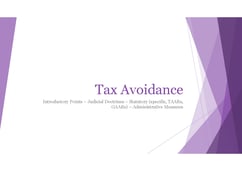IRC v Plummer [1979] 3 All ER 775
Judgement for the case IRC v Plummer
Table Of Contents
If there is no element of bounty the transaction is not a settlement.
-
A charity paid £2,480 to the taxpayer (T) who covenanted to pay the charity a sum which, next of tax at basic rate, would amount to £500 each year for 5 years. The purpose of the scheme was to enable T to reduce his liability to surtax.
The payments were annual payments, being income of the charity under Schedule D, Case III and, in consequence deductible under TA 1988, s835.
The difference between £500 grossed up at basic rate and £500 was thus relieved from surtax, enabling T to keep the benefit of the tax relief himself.
Despite the fact that the arrangement was made solely to obtain the tax advantage, HL held that, as there was no bounty between the parties, it was not a settlement.
Today the scheme would fail either because the House has since held that the payments were not ‘annual payments’ after all (Moodie v IRC) or because such schemes were stopped (prospectively) by statute in 1977 (though still leaves Plummer as an example of the no-bounty test).
Lord Diplock
The competing views are, on the one hand, that the context in which the word "settlement" appears shows a parliamentary intention to exclude from its meaning bona fide business transactions only, and, on the other hand, that it shows an intention to include only transactions in which there is an element of bounty.
It is necessary to apply to this Part of the Act a purposive construction and to ask oneself the question in relation to the particular kind of transaction which is under consideration.
Can Parliament really have intended to tax this particular kind of transaction by the wide words that the draftsman has used?
If the only sensible answer to that question is "No" the words of the Act should be understood as inapplicable to the transaction.
Lord Wilberforce (with whom Lord Keith agreed)
But it still becomes necessary to inquire what is the scope of the words "settlement" and "settlor" and of the words which are included in "settlement" in the context in which they appear.
If it appears that a completely literal reading of the relevant words would so widely extend the reach of the section that no agreement fell outside it, but that a legislative purpose can be discerned which Parliament can reasonably be supposed to have intended, and that the words used fairly admit of such a meaning as to give effect to that purpose, it would be legitimate, indeed necessary, for the courts to adopt such a meaning.
The courts which have had to face this problem, have selected the element of "bounty" as a necessary common ch of all the "settlements" which Parliament has in mind. With the "element of bounty" test we have a definition which is in agreement with the intention of Parliament as revealed through the whole code of Chapter XVI.
There cannot be any doubt that in this case no element of bounty existed.
The familiar argument was used that Parliament can never have intended to exempt from the taxing provisions an arrangement solely designed to obtain fiscal advantages. But this is not the question, nor is a canon of interpretation of this kind an admissible - or indeed a workable canon.
-
The question is whether a certain series of transactions in a certain legal form do or do not fall within the taxing words.
If they do not, and if Parliament dislikes the consequences, it can change the law - as in fact it has done since the scheme in question was operated.
The subject is entitled to be judged under the law as it stood at the relevant time.
Lord Fraser
The appellants contended that the definition in s454 (3) applied to all transactions that did not have a bona fide commercial reason, and that it applied to the present transaction, the sole reason for which was to avoid tax.
The respondent contended that the definition applied only to transactions which included an element of bounty.
-
In many cases the two contentions might lead to the same result, but not here.
In my opinion the true rule is that the definition applies only where there is an element of bounty.
The commercial transaction test goes too far; many transactions which are perfectly legitimate forms of investment, are entered into solely, or at least predominantly, for tax reasons, and it would be wrong to suggest that they might be taxable for that reason alone.
For Further Study on IRC v Plummer
Need instant answers? Our AI exam tutor is here to help.
Ask questions 🙋 Get answers 📔 It's simple 👁️👄👁️
Our AI is educated by the highest scoring students across all subjects and schools. Join hundreds of your peers today.
Get StartedSimilar Cases
Related Product Samples
These product samples contain the same concepts we cover in this case.
| Tax Law | Income Tax Notes (12 pages) |

 Since 2010, Oxbridge Notes has been a trusted education marketplace, supplying high-quality materials from top achievers at universities like Oxford, Cambridge, LSE, Harvard, and Yale.
Since 2010, Oxbridge Notes has been a trusted education marketplace, supplying high-quality materials from top achievers at universities like Oxford, Cambridge, LSE, Harvard, and Yale.